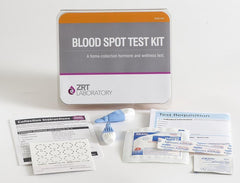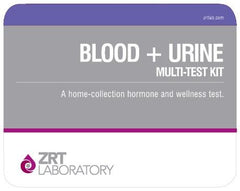
By Amen Clinics, ZRT Laboratory
Your thyroid is a small, butterfly-shaped gland located in the lower front part of your neck. Its job is to secrete hormones that control growth/development during childhood, regulate your metabolism and body temperature, and drive the production of many neurotransmitters in your brain. Specifically, the ones that help you feel good and enough have motivation to accomplish your goals: serotonin, dopamine, adrenaline, and noradrenaline.
It’s estimated that tens of millions of people worldwide have thyroid problems—anywhere from 5-25% of the world’s population. In the book, Thyroid Mind Power, it’s reported that, “the last 40 years have witnessed a massive increase in the amount of hormone-disrupting synthetic chemicals, finding their way into our air, food and water…The most sensitive and highly susceptible of human tissues turned out to be the thyroid gland.”
8 Factors that Inhibit Healthy Thyroid Function
- Excess stress and cortisol production
- Selenium deficiency
- Deficient protein, excess sugar
- Chronic illness
- Compromised liver or kidney function
- Cadmium, mercury, lead toxicity
- Herbicides, pesticides
- Oral contraceptives, excessive estrogen production
Thyroid problems are increasing in the population and especially among women, often surfacing after pregnancy and during middle age. It’s estimated that 1 out of 4 postmenopausal women has thyroid imbalances, and according to Ridha Arem, M.D., nearly 45% of people over 50 have some degree of thyroid gland inflammation, which is an early sign that thyroid imbalance is likely to occur.
Thyroid imbalance is a major cause of depression, anxiety, mental fog, and memory issues:
- One-third of all depressions are directly related to thyroid imbalance.
- 80-90% of postpartum depression is associated with thyroid abnormalities.
- More than 80% of people with low-grade hypothyroidism have impaired memory function.
The two most common thyroid imbalance issues are hypothyroidism and hyperthyroidism:
-
Hypothyroidism, or underactive thyroid – when the gland does not produce enough hormone. Symptoms include:
- Feeling tired all the time
- Weight gain
- Dry skin
- Brain fog, or “feeling spacey”
- Depression
- Anxiety
- Feeling cold all the time, even when others feel hot
- A body temperature that tends to be lower than 98.6
-
Hyperthyroidism, or overactive thyroid – when the gland produces too much hormone, causing everything in your body to work too fast. Symptoms include:
- Feeling jittery, as if you have had too much caffeine
- Sleeplessness
- Anxiety
- Irritability
- Racing thoughts
- A fast pulse
- Breathlessness
- Weight loss, despite an increased appetite
- Feeling too hot for no clear reason
Suspect Thyroid Imbalance?
It’s difficult to know if your thyroid is truly balanced without a simple blood test, which is something that your primary care physician should be willing to provide. The main thyroid hormones—TSH, T3, and T4—all have to be in the right balance for you to feel your best.
Blood Test Checklist
When your doctor checks your thyroid, don’t settle for a TSH test alone—it only measures your thyroid stimulating hormone. TSH levels can be normal, even while you have an undiagnosed thyroid problem. Instead, if you have any symptoms, insist your doctor order the following tests:
- TSH (according to the American Association of Clinical Endocrinologists, anything over 3.0 is abnormal and needs further investigation)
- Free T3 (active)
- Free T4 (inactive)
-
Thyroid antibodies
- Thyroid peroxidase antibodies (TPOab)
- Thyroglobulin antibodies (TG)
- Liver function tests (95% of T4 is “activated” in the liver) so having a healthy liver is essential).
- Ferritin level (ferritin is like the bus that drives the active T3 into the cells for the activity to occur. Ferritin needs to be above 90 for this to occur).
Balancing Your Thyroid
Thyroid issues can be effectively treated with a number of thyroid medications, but your doctor needs to test your levels regularly to assure that you are not taking too much or too little. |
Thyroid issues can be effectively treated with a number of thyroid medications, but your doctor needs to test your levels regularly to assure that you are not taking too much or too little.
There are also a number of natural dietary supplements that support thyroid function, including the herb rosemary, zinc, chromium, potassium, iodine, l-tyrosine, vitamins A, B2, B3, B6, C, D, selenium, seaweed, and ashwagandha. Also, make sure to have healthy testosterone, insulin, and melatonin levels.
While these thyroid tests can be helpful, in the final analysis your doctor should treat YOU, not the blood test. We have seen many women with hypothyroidism not treated by their physicians because their thyroid numbers were low but “within normal limits.” It’s a little like saying a vitamin D level of 21 is normal (normal range is 20-80).
How you feel and how you function (e.g., energy, constipation, dry hair, dry skin, cognition, body temperature) is more important in assessing thyroid function than just using arbitrary blood test normal ranges.
Related Products
 Thyroid Hormone Test (Profile -Essential)
Thyroid Hormone Test (Profile -Essential)

